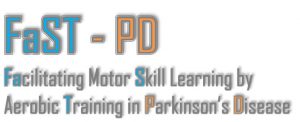FaST-PD
Facilitating Motor Skill Learning by Aerobic Training in Parkinson’s Disease (FaST-PD)
Parkinson’s disease (PD) is a neurodegenerative disease characterized by a steadily progressive loss of movement quality and safety. Movement therapy interventions aim particularly at maintaining and (re-)learning basic motor functions. The positive effect of skill practice is based on central nervous reorganization processes (i.e. neuroplasticity), and thus can be understood as a form of memory formation. This ability, also known as motor learning, remains preserved during the course of disease, but it is largely reduced compared to the age norm. Therefore, a major goal of current therapy research is to identify strategies to optimize impaired motor memory formation. A promising approach is based on current studies that have shown to increase motor memory formation in healthy adults by combining motor practice with an acute cardiovascular exercise stimulus. The FaST-PD project aims to investigate whether these effects can also be obtained in PD patients. Within the project, a total of three experiments are planned.
Further information:
Further information:
Further information:
Period: 2017 – 2021
Principal investigator: PD Dr. Simon Steib
Project staff: Philipp Wanner, Florian Ostermair
Associated researcher / clinicians:
- University hospital Erlangen – Department of molcular neurology (Prof. Dr. med. Jürgen Winkler, Prof. Dr. med. Jochen Klucken);
- Sana Krankenhaus Rummelsberg / Nuremberg – Klinik für Neurologie (PD Dr. Martin Winterholler);
- Klinikum Würzburg Mitte, Standort Juliusspital – Abteilung für Neurologie (Prof. Dr. med. Mathias Mäurer)
Funding: German Foundation Neurology (Deutsche Stiftung Neurology – DSN)
Further information: Motor Control and Health Lab
